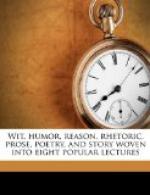“Uncle, would you loan me three cents to cross the ferry?”
“Boss, ain’t you got three cents?”
“I ain’t got one cent,” replied the white man.
“Well, you can’t git the three cents. Ef you ain’t got three cents, you’se just as well off on one side de river as you is on de other.”
I said we may differ as to methods for solving this race problem. Remembering as I do the days of slavery, how in Christian homes the most merciful masters and the most faithful slaves were found, I believe the best solution lies in the golden rule of the gospel of Jesus Christ.
I now give the searchlight a swing and it falls upon the City Problem.
At the opening of the nineteenth century three per cent. of the people of this country lived in cities, ninety-seven per cent. in the country. At the rate migration is now going from country to city in twenty years there will be ten millions more people in the cities than in the country. This means a change of civilization, and new problems to solve. It means a day when cities will control in state and national elections, and if ignorance and vice control our cities, then virtue and intelligence as saving influences will not suffice to save us. The ignorance prominent in the machinery of large cities is illustrated by the police force of New York City. When applicants for positions on the police force were being tested a few years ago, the question was asked: “Name four of the six New England States.” Several replied: “England, Ireland, Scotland and Wales.” Another question was: “Who was Abraham Lincoln?” As many as ten answered: “He was a great general.” One said: “He discovered America;” another said: “He was killed by a man name Garfield;” and another’s answer was, “He was shot by Ballington Booth.”
The growth of large cities means the growth of slum-life. Hear me, you who live out in the uncrowded part of the country. Maud Ballington Booth tells of finding five families, living in one attic room in New York City, with no partitions between. Here they “cook, eat, sleep, wash, live and die,” in the one room. In our large cities are armies of children, whose shoulders “droop with parental vice,” whose feet are fast in the mire of miserable conditions, whose hovel homes line the sewers of social life, and who are cursed and doomed by inheritance.
Some twenty or more years ago, a Chicago paper that had money behind it, and could have been sued for damages said: “The man who controls the purse strings of this city, the school board and board of public works, is the vilest product of the slums, a saloon keeper, a gambler, a man a leading citizen of this city would not invite into his home.” That man then controlled the purse strings of the great city of Chicago. I am glad to say a better man holds the place today. Hannibal could not save Carthage; Demosthenes could not save Greece; Jesus himself could not save Jerusalem. Can we save the cities of this republic?




